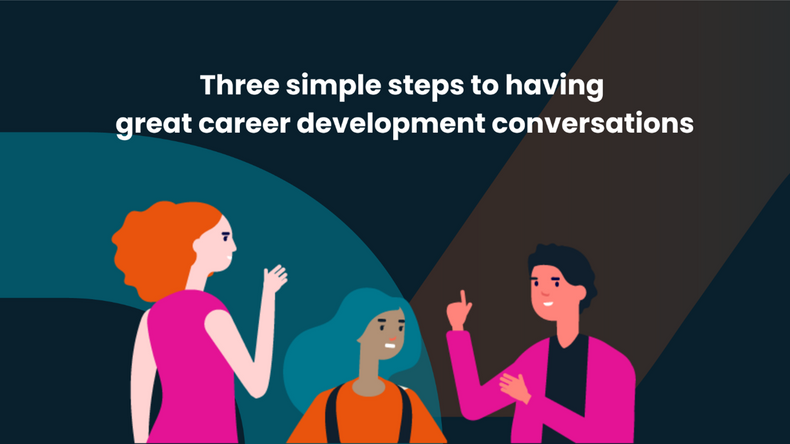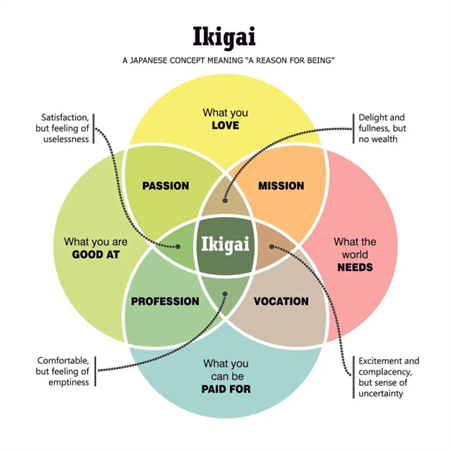Three simple steps to having great career development conversations

A challenge that often comes up for managers in coaching or on development programmes is how to have a great career development conversation with their team. It can be difficult to know where to start.
It can be tempting to release our ‘advice monster' and tell people what role we think they should do. We can make assumptions what's right for someone else's career without asking what really matters to them. If we haven't had great development conversations with our own manager it can be hard to know what a good career conversation looks like, especially if we haven't had other role models to show us the way.
Here are three simple steps to having great career conversations with your team!
- Start with what success means to them.
- Find out not just what people are good at but also what they enjoy and what gives them energy.
- Help people understand the gap between where they are now and where they want to be in the future. Support them to identify clear milestones to get to their successful career goal.
- Our own definition of career success
Success means different things to different people. Our current version of career success might be what we think we should do. For example what our family, our boss or even society believes to be successful... Income, status, job titles etc.
We often don't get a chance to explore what a successful career really means to us. The type of work we're doing. Who we're working with… or how flexible or varied our work is.
One of the biggest opportunities we have as a manager is to help people define their own version of success. There are some great coaching questions we can use to help do this.
- What are you doing when you are really ‘in the zone'?
- What gives you real joy at work?
- How are you working when you feel most motivated?
- Who are you working with when you feel at your best?
- What challenge or opportunity would you most like to work on?
- What does successful really mean for you? What would your perfect week look like?
These questions help people think past job titles and traditional definitions of success and really identify what's important for them. And it's okay to say that financial gain is a key criteria of a successful career… but it doesn't have to be the only one.
- What we love doing… not just what we're good at
From our early days in education our career often takes shape based on what we're good at.
True fulfilment at work comes not only doing something we can feel competent in doing but also doing work that aligns with our preferences, our enjoyment and what gives us energy. We can be very skilled at a number of different activities and tasks… that doesn't mean that we enjoy them.
If your team members are not really sure how they prefer to communicate, process information and problem solve there are many personality preference tools that can help raise their self-awareness such as DiSC® which is one we use at CAPE.
The Japanese word ‘ikigai' means ‘reason for being' or ‘purpose'. Ikigai can be found when you do not only what you're good at and what you can be paid for but also when you do what you love and what the world needs.

(Reference: ‘Ikigai The Japanese Secret to a long and happy Life by Hector Garcia and Francesc Miralles)
The Ikigai model can be a useful tool to use with your team to help them explore what activities they love doing that give them energy and how these can be combined with their skills and key interest areas to identify numerous career pathways.
- Help people understand the gap and where they want to get to
The most empowering career development conversations happen when a manager helps their team member to identify what they would really like to be doing in the future and helps raise their awareness of where they currently are.
This can be done through courageous conversations with your team member to explore their strengths, knowledge, experience, support and areas where improvement is needed through a combination of coaching style questions and key insights the individual might not be aware of.
A great question to ask is;
‘If the next role you want to do would be 10 on a scale, how many points out of 10 would you say you are at now?'
They might answer that they feel like they are around a ‘6'. So, from here you can help them explore the steps they might need to take to get to an 7, then an 8, a nine and then 10.
This conversation then develops with the outputs becoming a tangible development plan with clear steps on what they need to.

The creation of the development plan and ownership of the actions and final goal sits firmly as the responsibility of the individual in the team… not the manager.
The individual feels empowered and supported by you, their manager. It's unlikely that individuals will be able to think through and have clarity on all of these things in just one career development conversation.
Our role as managers is to create the space for people to develop their thinking and shape it with different work experiences and insights. It's important that people know it's okay not to know ‘what they want to be when they grow up'... even much later on in life! And it's important that people know that it's okay to change career direction...sometimes multiple times to find what is right for them!
Great career development conversations and the impact they can have on an individual are one of the most rewarding aspects of being a people manager.
The key things to remember if you are the manager are;
- not to make any assumptions that you know what your team member's definition of a successful career is…
- not make any assumptions around what they really love doing and what motivates them..
- and to resist jumping straight in to tell them what to do and the steps they need to take.
CAPE Coaching & Development equip, empower, and enable brilliant people managers through development programmes, workshops and 1-2-1 coaching. Learn more by clicking here.
